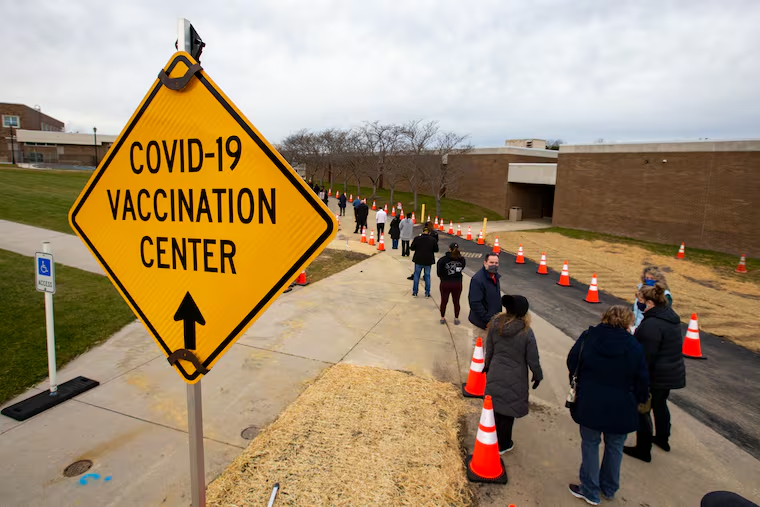Trump administration is trying to accelerate Operation Warp Speed, but you might not get your vaccine any sooner
Can a lame-duck administration inject new life into the COVID-19 vaccine rollout? Eight days will tell.

Trump administration officials on Tuesday announced major changes to the federal COVID-19 vaccination playbook — while acknowledging that in eight days, they will lose control over a rollout that has been far slower and bumpier than they promised.
During a Tuesday news briefing, Secretary of Health and Human Services Alex Azar said that beginning in two weeks, vaccine allocations to states will be based on the number of doses already administered and the number of residents who are senior citizens. Azar urged states to vaccinate anyone age 65 or older and younger people with chronic health conditions, and blamed the lagging rollout in part on states that are being “over-prescriptive and micro-managing” the four-week-old immunization effort.
Most states, including Pennsylvania and New Jersey, are following Centers for Disease Control and Prevention guidance to prioritize the highest-risk groups for the initially limited vaccine supply.
Azar also said the government would be releasing its entire supply of Pfizer-BioNTech and Moderna vaccines, rather than withhold enough for second doses, because ramped-up manufacturing can now keep pace with the required two-dose regimen. Pfizer says it is confident it can deliver 200 million doses to the United States by the end of July.
State and local officials, who have been tasked with carrying out the massive vaccination effort, reacted with caution, noting that systems for notifying people and getting shots in their arms are barely off the ground.
» READ MORE: How to sign up for a Philly COVID-19 vaccine alert that will tell you it's your turn
The reversal on withholding doses comes days after President-elect Joe Biden’s promise to release nearly all of the vaccine stockpile after his Jan. 20 inauguration. He is expected to provide details of his vaccination plans later this week.
As of Tuesday, Operation Warp Speed, the Trump administration’s initiative to accelerate vaccine development and distribution, apparently had not met with Biden’s team.
“We at Operation Warp Speed made the decision” to change the playbook, Azar said. “We will certainly brief the Biden team, but we operate with one government at a time.”
“I hope,” Azar added, “the Biden administration is able to carry forward these results.”
The existing rollout plan, which federal and state health officials spent many months developing, has phases, based on occupational and personal risks and roles. The top-priority group — 25 million frontline health workers and nursing home residents — is now getting shots. The next group includes essential workers outside health care and people age 75 and over, although states have discretion to deviate from or refine CDC guidance.
“We clearly have enough vaccine at this point to begin to expand” beyond the first priority group, CDC Director Robert Redfield said during the news conference.
» READ MORE: Who should and shouldn’t get the COVID-19 vaccine
CDC data published Monday show that of 40 million doses bought by the government, 25 million doses had been delivered to the states, and almost nine million had been administered. That’s a far cry from the Trump administration’s prediction that 20 million Americans would be vaccinated by the end of December.
There have been many bottlenecks, but a big one, public health experts say, has been the lack of federal coordination and consistency. For example, Azar said the government is telling states to use pharmacies, community health centers, and mass vaccination sites to get the vaccines into arms. But the infrastructure to do that is only now being rolled out.
It should have been put in place while vaccine clinical trials were underway, said Paul Offit, a Children’s Hospital of Philadelphia pediatrician and vaccine expert who serves on a federal vaccine advisory panel. “We should have had that ready and we didn’t,” he said.
Rite Aid, one of 19 pharmacy chains that have contracted with the government to administer vaccine, said that its current role is restricted.
“During this phase 1 of the CDC rollout plan, Rite Aid can only administer vaccinations to those individuals who have been approved and scheduled by its state or jurisdiction partners,” Jim Peters, Rite Aid chief operating officer, emailed Monday. “In Phase 2, however, Rite Aid will both schedule and administer vaccinations more broadly throughout our communities. Like many Americans, we anxiously await this broader rollout period.”
The latest top-down changes are not likely to smooth the way, state and local health officials said.
”This is a wholesale change out of the blue, after months of planning,” said James Garrow, spokesperson for the Philadelphia Department of Public Health. “It’s going to take a little bit to figure out how this impacts the multiple avenues of vaccine distribution and changes to our allocations and what administration looks like.”
In Pennsylvania, officials said the changes may affect how many doses the state receives, but not necessarily who gets them.
”Releasing those held-back second doses does not change the state’s planned approach,” said Barry Ciccocioppo, a spokesperson for the state’s Department of Health. “But it should help speed up the vaccination process.”
» READ MORE: Could cutting or delaying doses of the COVID-19 vaccine to immunize more people make the pandemic last longer?
Pennsylvania Health Secretary Rachel Levine said the state is open to considering vaccinating anyone 65 and over, but only after reviewing the new federal allocation plan.
New Jersey Department of Health spokesperson Dawn Thomas said the list of categories eligible for vaccination in the next phase “is under consideration and more information will be forthcoming.”
Staff reporters Jason Laughlin, Allison Steele, Frank Kummer, and Tom Avril contributed to this article.